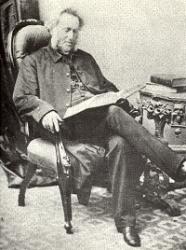
1648 - 1715 Meter: 8.7.8.7.7.7 Author of "God of Ages, All Transcending" in American Lutheran Hymnal Neumann, Caspar, son of Martin Neumann, city tax-collector at Breslau, was born at Breslau, Sept. 14,1648. He entered the Unversity of Jena in Sept. 1667, graduated M.A. in August 1670, and was for some time one of the University lecturers. On Nov. 30, 1673, he was ordained at the request of Duke Ernst of Gotha as travelling chaplain to his son, Prince Christian, whom he accompanied through Western Germany, Switzerland, Northern Italy, and Southern France; returning to Gotha in 1675. In 1676 he became court preacher at Altenburg, but in Dec. 1678 was appointed diaconus of the St. Mary Magdalene Church at Breslau, and pastor there in 1689. Finally, in Feb. 1697 he became pastor of St. Elizabeth's at Breslau, inspector of the churches and schools of the district, and first professor of theology in the two Gymnasia at Breslau. He died at Breslau, Jan. 27, 1715 (S. J. Ehrhardt's Presbyterologie Schlesiens i. 211; Allgemeine Deutsche Biographie xxiii. 532, &c). Neumann was a celebrated preacher, and edited a well-known prayer-book, entitled Kern alter Gebete (Breslau, 1680; complete ed. Breslau, 1697) which passed through many editions. He wrote over thirty hymns, simple, heartfelt and useful, which became very popular in Silesia, and almost all of which passed into Burg's Gesang-Buch, Breslau, 1746, and later editions. They mostly appeared, with his initials, in the 9th ed., N.D., but about 1700, of the Breslau Vollständige Kirchen-und Haus-Music. Those which have been translated are:—
i. Adam hat im Paradies. Christmas. 1700, as above, p. 71, in 8 stanzas. In the Unverfälschter Liedersegen, 1851, No. 23. Translated as "Adam did, in Paradise." By Miss Manington, 1864, p. 21.
ii. Grosser Gott, von alten Zeiten. Sunday Morning. 1700, p. 886, in 6 stanzas of 6 1ines as "for Sundays and Festivals." Thence in many Silesian hymnbooks, and in the Unverfälschter Liedersegen, 1851, No. 481. The translations in common use are:-—
1. God of Ages never ending, Ruling. A good translation, omitting stanza iii., by H. J. Buckoll in his Hymns from the German, 1842, p. 5. His translations of stanzas i., ii., vi. were repeated in the Dalston Hospital Hymn Book, 1848; the Rugby School Hymn Book, 1850 and 1876, and others.
2. Great God of Ages! by whose power. A translation of stanzas i., ii., vi. as No. 10 in J. F. Thrupp's Psalms & Hymns, 1853.
3. God of Ages never ending! All creation. A good translation of stanzas i., ii., vi., based on Buckoll, con¬tributed by A. T. Russell to P. Maurice's Choral Hymn Book, 1861, No. 466.
4. God of Ages, great and mighty. A translation of stanzas i., ii., v., vi. by C. H. L. Schnette, as No. 291 in the Ohio Lutheran Hymnal 1880.
iii. Herr! auf Erden muss ich leiden. Ascension. 1700 as above, p. 1098, in 6 stanzas of 8 lines, and in the Unverfälschter Liedersegen, 1851, No. 159. The translation in common use is:—
(1) Lord, on earth I dwell sad-hearted. A good translation, omitting stanzas iv., v., by Miss Winkworth, as No. 66 in her Chorale Book for England, 1863; repeated in the Ohio Lutheran Hymnal, 1880. Another translation is (2) "Lord, on earth I dwell in pain." By Miss Winkworth, 1855, p. 106.
iv. Mein Gott, nun ist es wieder Morgen. Morning. 1700, as above, p. 871, in 6 stanzas, and in the Berlin Geistliche Lieder ed. 1863, No. 1119. Translated as "My God, again the morning breaketh." By Miss Manington, 1863, p. 118.
v. Nun bricht die finstre Nacht herein. Sunday Evening. 1700 as above, p. 982, in 11 stanzas. In the Berlin Geistliche Liedered. 1863, No. 1177. Translated as "Soon night the world in gloom will steep." By Miss Manington, 1863, p. 152. [Rev. James Mearns, M.A.]
--John Julian, Dictionary of Hymnology (1907)
Caspar Neumann


 My Starred Hymns
My Starred Hymns





